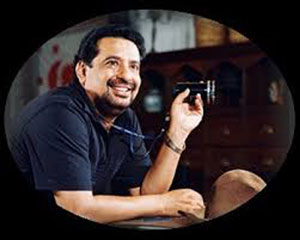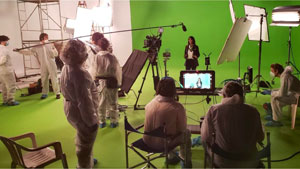Film, teledrama can start work with health guidelines
As a first step to begin the work in film and teledrama industry, the Health Ministry last week issued a set of guidelines when pre, during and post production stages of any teledrama or film. Operational guidelines that should be followed on preparedness for response for COVID-19 outbreak for the film, teledrama industry, provided specific instructions to be followed when an artistic creation is produced.

Bennett Rathnayake
Those in the teledrama and film industry welcomed the move by the Health Ministry and noted that though they would create difficulties and practical problem the guidelines should be followed for the good of all.
“These were the basic guidelines that have to be followed to prevent spreading of COVID-19 in a place where people gather. We have to follow them hundred percent,” Bennett Rathnayake former Chairman of both Tele Makers Guild and Film Directors Guild.
He said anyway teledrama and cinema industries are not so financially strong industries and there would be an additional expenditure to follow these guidelines. “Secondly when transport facilities are arranged we usually go as a team. There are hardly any instances where limited numbers of passengers are accommodated in the vehicles”.
Mr. Ratnayake who has made about ten teledramas and four films including ‘Aswesum’ (2001), ‘Sulanga’ (2005), ‘Ira Handa Yata’ (2009) and ‘Nela’ (2018) said most challenging thing to follow would be to maintain social distancing when filming is done.
‘It will be difficult perform maintaining social distancing. It would be impossible to maintain one metre distance between the actors and actresses if the script requires to do so. According to the script there would be instances where they have to touch each other, fight, etc and also there are various physical expressions where one would have to scratch the head, nose and eyes. To do some of these would be hard but it is better if we somehow follow them. Even if we follow all these there would be a risk in case an infected person enters the sites’.
He also said that these more than the film industry, it is the teledrama that have to get ready to work with these guidelines. ‘Since the film theatres are closed and no film screening happening, those in the film industry can wait for some time. But the urgency is for those in the teledrama industry and specially those who have to produce daily teledramas,’ said.
The Health Ministry has issued following operational guidelines on preparedness for response for COVID-19 outbreak for the film and teledrama industry.
 According to the guidelines among other things during the pre-production planning and pre discussions of the production should be done using online conference methods at all possible occasions.
According to the guidelines among other things during the pre-production planning and pre discussions of the production should be done using online conference methods at all possible occasions.
And during the production, directors and producers are advised to provide hand washing facilities and alcoholic hand sanitizer should be available at the set and waiting areas. The Ministry also has stated;
n Work should be coordinated in such a way that a limited number of people are given access to space at any one time during the shooting at all possible locations. In the event that a scene is being filmed in a small space, only the following people are recommended access while filming. E.g. artists, camera operator, sound recordist. Provide remote viewing facilities for all other people if possible.
Ensure frequent cleaning of contact surfaces of the location. This includes; door handles, surfaces, bathroom fixtures and any equipment handled by more than one person.
n Assess the health states of the crew regularly. Anybody having any respiratory symptoms (cough, fever, runny nose, sore throat and difficulty in breathing) should not be permitted to entry to the set and should be directed for a medical opinion. Information regarding the risk of spreading COVID-19, and what behaviour is expected from the crew is to be available. Masks should be provided to the crew on any occasion where physical distancing measures are difficult to maintain. Costumes of each artiste should be kept separately washed thoroughly and not to be shared.
 Anti-congestion measures should be practised during transporting the crew. Different working groups of the crew should be transported separately at all possible occasions. Encourage to use their personal vehicle if possible.
Anti-congestion measures should be practised during transporting the crew. Different working groups of the crew should be transported separately at all possible occasions. Encourage to use their personal vehicle if possible.
Guidelines for Filming are
Avoid crowd scenes where physical distancing cannot be maintained at all possible occasions. For interior shootings, the maximum number of crew permitted entry at any one time should be based on the space of the location. The number of crew on set should be kept to the minimum required. Call times should be planned for each working groups by giving access at timed intervals, to prevent crowding during the shooting.
Ensure good ventilation of interior spaces to minimise the risk of spending the infection by means of open windows at all possible occasions.
During make-up
- The make-up artiste should wear a mask properly.
- Allow only a limited number of artistes to enter the make-up room at a particular time.
- Seating for the artistes should be arranged outside the room.
- Regularly disinfect the make-up table and changing room.
- Provide hand washing facilities/ hand sanitizers for make-up artists to regular hand washing.
- Make-up artistes required to wash hands with soap and water or sanitize their hands before and after attending to each individual for hair and make-up.
- Clean used make-up equipment properly before using them for another person. E.g. sponges, brushes etc.
- Encourage artiste to bring personal make-up applicators.
- Artistes should be encouraged to wear their own clothes and dress from home at all possible occasions. In the event that this is not possible, is required to provide dressing facilities where physical distancing measures be upheld.
- Food
- Buffets are not permitted. All meals should be served as food packs.
- All drinks should be in single-serving containers. e.g. water bottles.
- Avoid sharing food, beverages, glasses, cups with others.
- Avoid gatherings during mealtime and arrange meals at different time intervals to minimize overcrowding.
- During the Post-production (dubbing/ editing)
- Clean audiovisual equipment and commonly touched surfaces / editing tables regularly using disinfectant solutions.
- Mics and earphone should be cleaned before using them for a new person.
- Promote proper hand hygiene among technical staff.
- Should maintain the physical distance among artistes during the recordings.
- Appoint a minimum number of technical officers for a shift on roster basis.
The Health Ministry has asked to contact Dr. Palitha Karunapema, Director Health Promotion Bureau on 0777708487 email palitha_66@yahoo.com and Dr. Priyanga Ranasinghe, Consultant Community Physician, Unit Head-Risk Communication, Media and Publicity, Health Promotion Bureau on 0777552794, email pnyangaran@yahoo.com for any clarification and more details.



